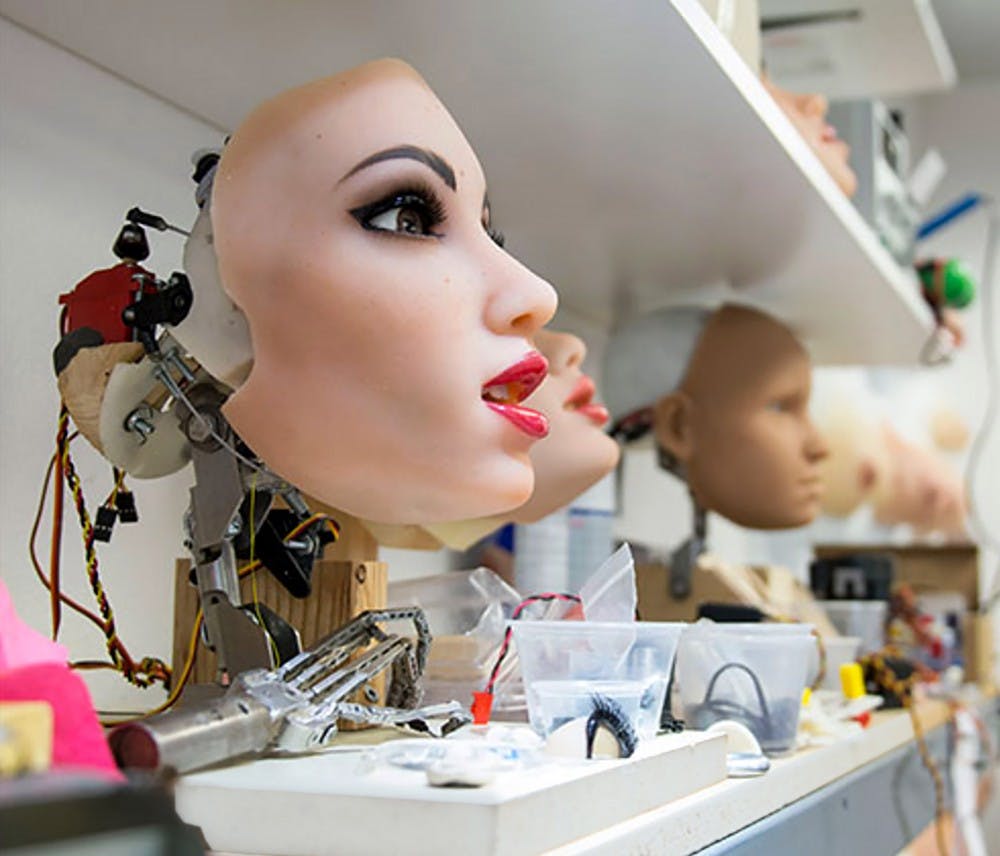The days of making love to sex dolls that are no better than inflatable pool toys are over. In 2018, sex dolls can love you right back and ask you about your day.
Companies like Synthea Amatus and RealDoll have developed realistic sex dolls, equipped with interactive memory features and sexual abilities. In past years, developers like TrueCompanion have made robots like Roxxxy, a bot programmed to respond to user preference and communication capabilities.
Matt McMullen is the CEO and founder of RealDoll, a California-based manufacturer developing a sex robot since 2013. Of the dozens of characters McMullen has created at his company, the Realbotix project’s model differs in its realistic nature.
“She can carry on a conversation, respond to intimacy and remember things about the people she interacts with,” McMullen said. “Touch sensors, full body heating and self-lubrication as well as vision and motion detection are all features in development.”
The bots' facial and bodily features look to replicate human functions, according to Realbotix’s website. Realbotix claims its product can be positioned in “hundreds” of ways, its face system “enable[s] users to attach different faces.”
The bots, which operate on a low voltage system and battery pack, are fully customizable in their features. McMullen thinks people are excited for the new dolls and adding robotics and AI to the doll only enhances it.
“Our customer base is very very diverse, and it is difficult to state a specific demographic,” McMullen said. “People are attracted to the dolls for a lot of different reasons beyond just sex.”
If you’re looking to purchase a bot, which is currently available for pre-order, McMullen said its price will be roughly $12,000 to $18,000, depending on its level of customization.
Dr. Michelle Mars is a lecturer in psychotherapy at Australia’s Jansen Newman Institute. In 2012, Mars and her colleague Ian Yeoman foresaw the future of sex robots being used for prostitution by 2050, according to the Huffington Post.
Mars thinks as sex doll technology becomes more realistic, the market will differentiate into those looking for authenticity and realism and those seeking simulation.
“They can be a vehicle for sexual learning and exploration, [so] gender and sexuality will become more contingent and fluid,” Mars said.
“Women have been interacting with sex machines since the 1800s when vibrators were first invented. They will be with us into the future. They will be an alternative to a real life encounter, but they will never replace it.”
Students like Gabriela Jimenez, a junior biomedical sciences major, have seen posts on social media about the bots and how women should feel afraid of being replaced.
“I think it is unethical just because it’s not a human but it does the same thing as a human, so in a sense it can replace us,” Jimenez said.
“It can replace the communication and the bond you could have with an actual human. At the end of the day, it’s a robot and it’s not like it could reproduce so it takes the place of someone you could actually build a family with.”
Jimenez thinks that the bots’ human-like characteristics are impressive and thinks they’re beneficial for people with not a lot of social skills.
Others like Aishat Keshiro, a senior biological sciences major, feel fearful over how relationships will turn out with these advancements.
“We’re so impersonal now with technology so imagine if we bring robots into it; there’s another reason for us to disconnect more,” Keshiro said.
“Now people could just relay their emotions and feelings into objects instead of people. If people say this will replace women and change the dynamics of relationships, it’s very questionable as to the extent and how people will perceive it. I want to see how it will be foreshadowed.”
Mars said there’s no spiritual dimension to an interaction with a machine, as opposed to one with a human. She does think it’s possible to form attachments to non-human and inanimate others, such as a robot.
“Many of us are intimately connected to our phones. However, the attachment we might feel to our phones is different to the attachment we might feel to our lovers or parents or children,” Mars said.
“As AI becomes indiscernible from real the divide will diminish, however I believe it will always be there.”
Benjamin Blanchet is the senior features editor and can be reached at benjamin.blanchet@ubspectrum.com.

Benjamin Blanchet is the senior engagement editor for The Spectrum. His words have been seen in The Buffalo News (Gusto) and The Sun newspapers of Western New York. Loves cryptoquip and double-doubles.





